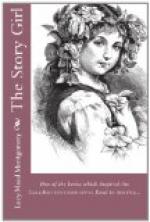“Uncle Roger says Peter’s father wasn’t exactly lazy,” said the Story Girl. “The trouble was, there were so many other things he liked better than work.”
“I wonder if he’ll ever come back to his family,” said Cecily. “Just think how dreadful it would be if OUR father had left us like that!”
“Our father is a King,” said Felicity loftily, “and Peter’s father was only a Craig. A member of our family COULDN’T behave like that.”
“They say there must be a black sheep in every family,” said the Story Girl.
“There isn’t any in ours,” said Cecily loyally.
“Why do white sheep eat more than black?” asked Felix.
“Is that a conundrum?” asked Cecily cautiously. “If it is I won’t try to guess the reason. I never can guess conundrums.”
“It isn’t a conundrum,” said Felix. “It’s a fact. They do—and there’s a good reason for it.”
We stopped picking apples, sat down on the grass, and tried to reason it out—with the exception of Dan, who declared that he knew there was a catch somewhere and he wasn’t going to be caught. The rest of us could not see where any catch could exist, since Felix solemnly vowed, ’cross his heart, white sheep did eat more than black. We argued over it seriously, but finally had to give it up.
“Well, what is the reason?” asked Felicity.
“Because there’s more of them,” said Felix, grinning.
I forget what we did to Felix.
A shower came up in the evening and we had to stop picking. After the shower there was a magnificent double rainbow. We watched it from the granary window, and the Story Girl told us an old legend, culled from one of Aunt Olivia’s many scrapbooks.
“Long, long ago, in the Golden Age, when the gods used to visit the earth so often that it was nothing uncommon to see them, Odin made a pilgrimage over the world. Odin was the great god of the northland, you know. And wherever he went among men he taught them love and brotherhood, and skilful arts; and great cities sprang up where he had trodden, and every land through which he passed was blessed because one of the gods had come down to men. But many men and women followed Odin himself, giving up all their worldly possessions and ambitions; and to these he promised the gift of eternal life. All these people were good and noble and unselfish and kind; but the best and noblest of them all was a youth named Ving; and this youth was beloved by Odin above all others, for his beauty and strength and goodness. Always he walked on Odin’s right hand, and always the first light of Odin’s smile fell on him. Tall and straight was he as a young pine, and his long hair was the colour of ripe wheat in the sun; and his blue eyes were like the northland heavens on a starry night.
“In Odin’s band was a beautiful maiden named Alin. She was as fair and delicate as a young birch tree in spring among the dark old pines and firs, and Ving loved her with all his heart. His soul thrilled with rapture at the thought that he and she together should drink from the fountain of immortality, as Odin had promised, and be one thereafter in eternal youth.




